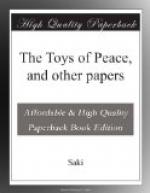“They were the heritage that history handed down to us, spoiled and diminished no doubt, in comparison with yet earlier days that we never knew, but still something to thrill and enliven one little corner of our Continent, something to help us to conjure up in our imagination the days when the Turk was thundering at the gates of Vienna. And what shall we have to hand down to our children? Think of what their news from the Balkans will be in the course of another ten or fifteen years. Socialist Congress at Uskub, election riot at Monastir, great dock strike at Salonika, visit of the Y.M.C.A. to Varna. Varna—on the coast of that enchanted sea! They will drive out to some suburb to tea, and write home about it as the Bexhill of the East.
“War is a wickedly destructive thing.”
“Still, you must admit—” began the Merchant. But the Wanderer was not in the mood to admit anything. He rose impatiently and walked to where the tape-machine was busy with the news from Adrianople.
FOR THE DURATION OF THE WAR
The Rev. Wilfrid Gaspilton, in one of those clerical migrations inconsequent-seeming to the lay mind, had removed from the moderately fashionable parish of St. Luke’s, Kensingate, to the immoderately rural parish of St. Chuddocks, somewhere in Yondershire. There were doubtless substantial advantages connected with the move, but there were certainly some very obvious drawbacks. Neither the migratory clergyman nor his wife were able to adapt themselves naturally and comfortably to the conditions of country life. Beryl, Mrs. Gaspilton, had always looked indulgently on the country as a place where people of irreproachable income and hospitable instincts cultivated tennis-lawns and rose-gardens and Jacobean pleasaunces, wherein selected gatherings of interested week-end guests might disport themselves. Mrs. Gaspilton considered herself as distinctly an interesting personality, and from a limited standpoint she was doubtless right. She had indolent dark eyes and a comfortable chin, which belied the slightly plaintive inflection which




